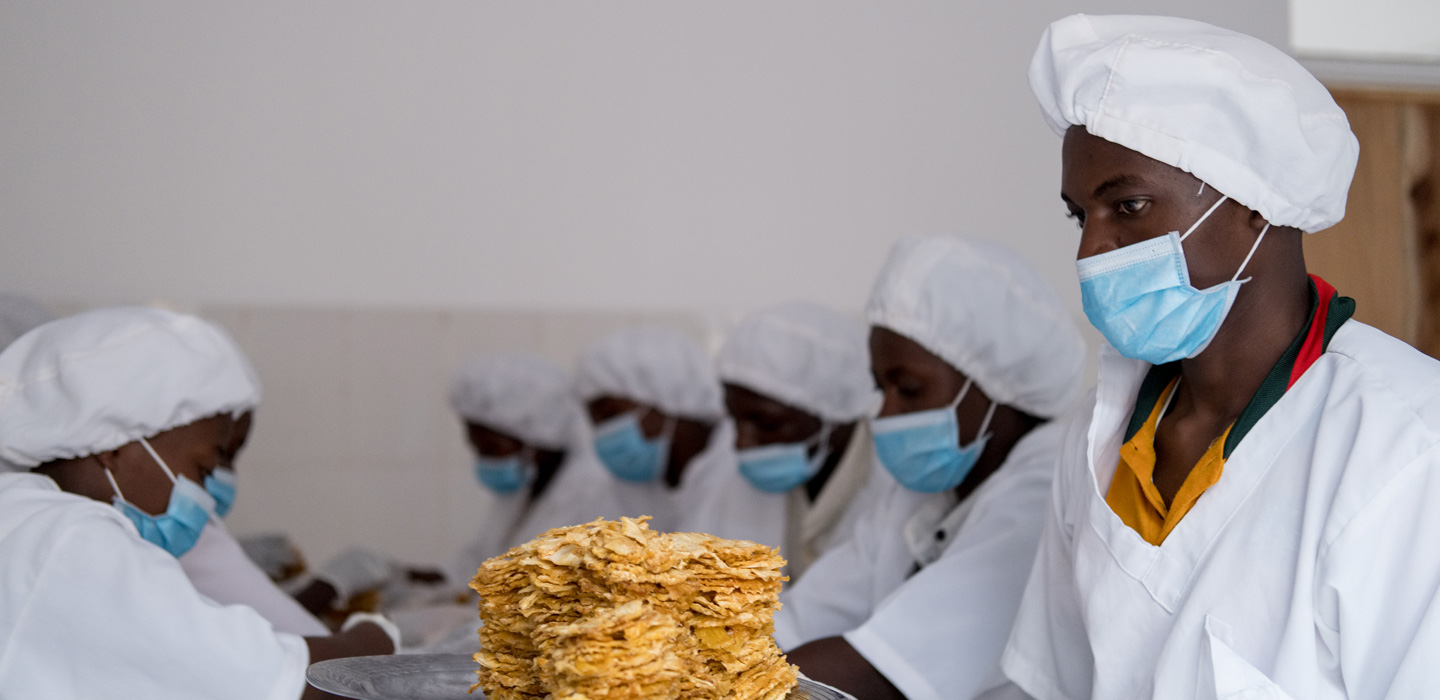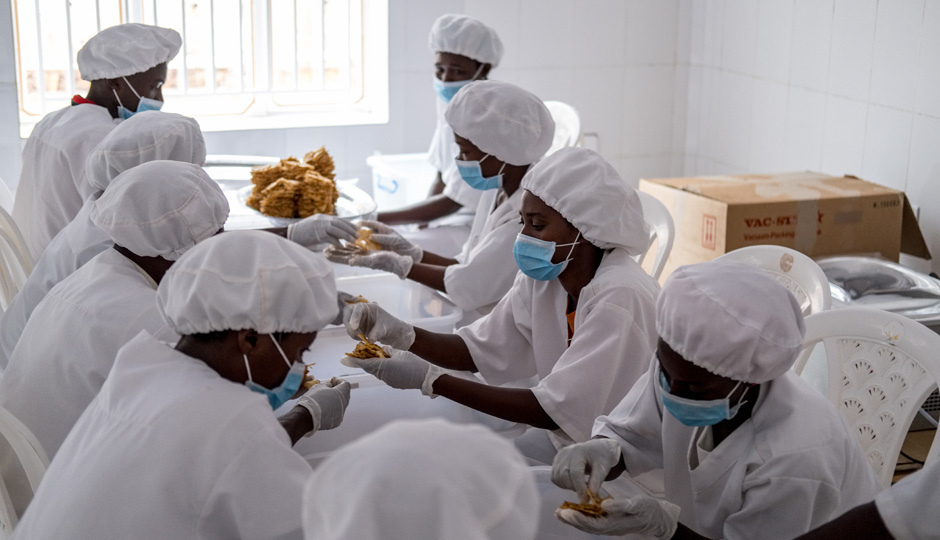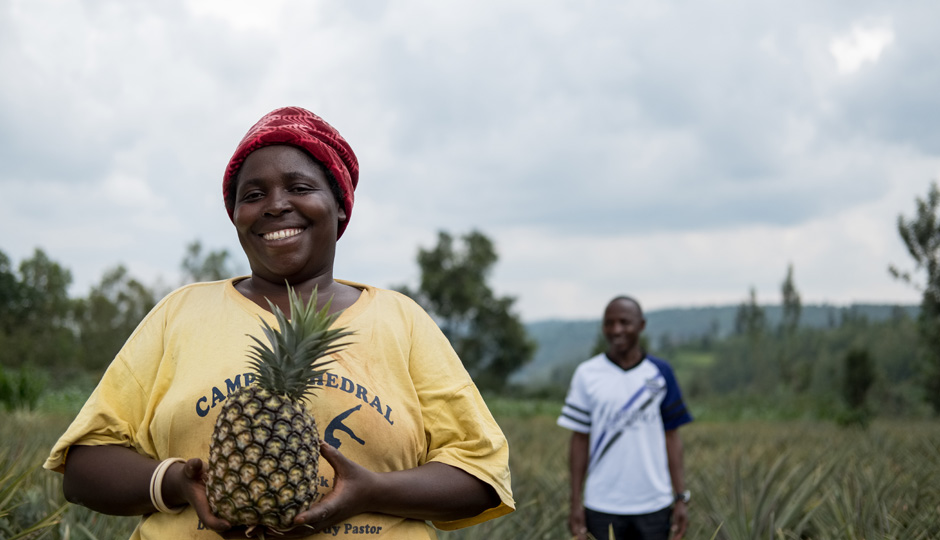Keeping exports flowing: Saving development gains in Rwanda
IFAD Asset Request Portlet
Asset Publisher
Keeping exports flowing: Saving development gains in Rwanda
Estimated reading time: 4 minutes
©IFAD/Edward Echwalu
When exports of dried pineapple resumed at the beginning of May, Jean Damascène Hakuzimana, president of the Tuzamurane farmers’ cooperative, was relieved.
The cooperative, based in the Kirehe district of Rwanda, had six tonnes of dried organic pineapple ready for export when COVID-19 struck. The various lockdown measures across the globe – the suspension of international travel, the movement restrictions in Europe that prevented their client in France from working and buying their products, the temporary closure of public activities in Rwanda – dealt the cooperative a significant blow, threatening the gains made from previous years’ investments and curtailing its ambitious prospects for growth.
“The impact on our activities was very big and we were uncertain of the future of the cooperative,” Jean Damascène says.
“We had to suspend temporarily some staff working in the processing unit. Farmers were still planting and harvesting but getting low prices for their pineapples. But now we are optimistic. We just exported two tonnes and [we] expect new orders.”
Going organic opens up new markets
Created in 2005, the cooperative has transformed into a successful pineapple growing and processing operation over the years.
The story really got started in 2009, when a cooperative member met some potential buyers of organic pineapples at a food exhibition in Belgium. With the support of the Government of Rwanda, the cooperative switched to organic production.
“At the beginning, it was difficult to convince farmers to move to organic techniques, but progressively they understood it is better for the soil and their health,” explains Albert Kamana, an agronomist at the cooperative. “We also pay double [the price of] normal traders and we ensure them a market,” Jean Damascène adds.
 |
| Workers in the Tuzamurane cooperative’s new processing centre prepare dried pineapple for shipment to Europe. ©IFAD/Edward Echwalu |
In 2015, the cooperative started to process their pineapples into dried slices and export their products to France. The Government of Rwanda assisted them with building their first factory and acquiring the dryers. USAID helped them purchase some of the equipment and recruit some of the permanent staff, and also provided post-harvest training. Now, the PASP project, a joint effort by IFAD and the Government of Rwanda, is supporting the cooperative as they expand their operations.
The project has enabled the cooperative farmers to increase their incomes – and brought substantial additional benefits, too.
As the business grows, so does the community
“I am now able to pay the school fees for our children,” says Jeanne d’Arc Nirere, a 39-year-old mother of four who joined the cooperative in 2016. “And we hope to send our children to university as well.”
Jeanne d’Arc manages the production alone; her husband is a truck driver. With the money she earns, she has invested in two and a half additional hectares of land to grow more pineapples.
“Pineapple production is my life now, and I am very optimistic it will get better,” she adds, smiling.
 |
| Jeanne d’Arc Nirere poses for a photo in her pineapple field. ©IFAD/Edward Echwalu |
The cooperative pays the health insurance of its 141 members and their families. Last year, it also started to contribute to their pension.
The cooperative also looks beyond its members. It has built water tanks and shelters for the poorest community members, and regularly gives away peeling (the pineapple’s outer skin) for free to feed local livestock.
Importantly, the cooperative also creates employment. Today, it employs 100 casual workers and 20 permanent staff. About 70 per cent are young people and 55 per cent are women.
“I am lucky to work here and many of my friends hope to come here; they have heard of the development plan,” says Honorine Mushimiyimama, a 22-year-old single mother employed at the processing plant. “Before joining, I had no money to buy food nor clothes for my child.”
Olivier Iradukunda is also 22 and also works at the processing plant. His income has opened up new perspectives for him and his family.
“I help my parents pay for my brothers’ school fees and I want to take up studying again, when I have saved enough,” he explains. In the meantime, he has started to grow maize on a piece of land he rents, and he also breeds pigs and chickens for extra earnings.
Carrying on in the face of COVID-19
The cooperative doesn’t want to stand still.
“We will move ahead with our business plan, despite the negative impact of COVID-19, and the fact we still have 4 tonnes of unsold produce,” says Jean Damascène Hakuzimana. “From the beginning, our story has been a journey from the darkness into the brightness.”
The cooperative still plans to increase their operations by about 70 per cent. That means increasing production from three tonnes per year to five tonnes, hiring an additional 12 permanent staff, and doubling the number of casual workers.
Thanks to PASP funding, a second, more modern processing plant has already been built. Now that their South African supplier is able to operate again, they expect the new dryer they ordered earlier this year to arrive within a month. They’ve also bought a tractor, which should be delivered in June.
Farmers are waiting, and requests to join the cooperative are many. It’s little wonder why: the benefits it brings members – and the wider community – are changing lives.
Publication date: 08 June 2020